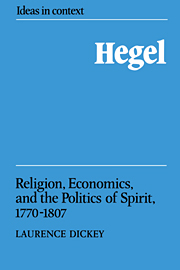Book contents
- Frontmatter
- Contents
- Preface
- Acknowledgments
- Introduction: Hegel in a Protestant cultural context
- Part I Hegel's Württemberg: “Civil Millenarianism” and the two faces of Protestant civil piety
- Part II Württemberg's Hegel: Applied theology and social analysis
- Part III Toward the Phenomenology: Sittlichkeit becomes a problem in social and political theory
- 5 Hegel discovers the economy
- 6 Sittlichkeit reconsidered: I. The essay on Natural Law
- 7 Sittlichkeit reconsidered: II. The essay on Ethical Life
- 8 Hegel's conception of the division of labor
- Epilogue: Bildung and politics: The “first class,” Christian pride, and “absolute spirit”
- Abbreviations
- Notes
- Index
8 - Hegel's conception of the division of labor
Published online by Cambridge University Press: 11 January 2010
- Frontmatter
- Contents
- Preface
- Acknowledgments
- Introduction: Hegel in a Protestant cultural context
- Part I Hegel's Württemberg: “Civil Millenarianism” and the two faces of Protestant civil piety
- Part II Württemberg's Hegel: Applied theology and social analysis
- Part III Toward the Phenomenology: Sittlichkeit becomes a problem in social and political theory
- 5 Hegel discovers the economy
- 6 Sittlichkeit reconsidered: I. The essay on Natural Law
- 7 Sittlichkeit reconsidered: II. The essay on Ethical Life
- 8 Hegel's conception of the division of labor
- Epilogue: Bildung and politics: The “first class,” Christian pride, and “absolute spirit”
- Abbreviations
- Notes
- Index
Summary
Thus far the basic thrust of Part III of this study has been to emphasize the importance of the religious–economic overlay in the development of Hegel's thought after 1796. This overlay, after all, prompted him to try to translate Sittlichkeit into the language of objective experience in general and into the principles of eighteenth-century social and political theory in particular. In this endeavor, moreover, Hegel's reading of the Scots was of vital importance. From them he learned not only about political economy and sociological realism, but also about how to use these conceptual tools to ground Sittlichkeit in the world of “objective experience.”
Initially, Hegel's effort to develop a more up-to-date philosophy of Sittlichkeit involved identifying the division of labor principle as essential to the constitution of the social moment of objective experience. As we saw in Chapter 7, the idea of the division of labor played a prominent role in Hegel's essay on Ethical Life: it was one of the driving forces behind man's movement from a presocial to a social condition of existence, and it was the key to the establishment of a network of interconnected institutional and value relationships that governed man's life within what Hegel called the system of “natural Sittlichkeit.” Indeed, in some respects it could be said that the division of labor constituted the core of Hegel's conception of the social moment of objective experience itself.
- Type
- Chapter
- Information
- HegelReligion, Economics, and the Politics of Spirit, 1770–1807, pp. 253 - 277Publisher: Cambridge University PressPrint publication year: 1987

